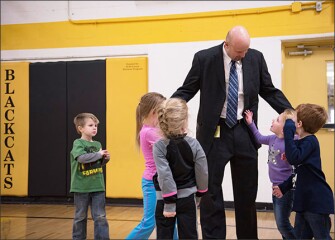
In 2016, the Wallace Foundation announced a four-year initiative to overhaul the way university preparation programs trained principals to meet school districts’ needs and reflect what research says is needed for effective school leadership.
What are researchers finding about the $48.5-million initiative?
, according to a report released Tuesday by RAND Education, a division of the RAND Corporation, which studied the program’s first year in 2017 and will provide periodic studies, as well as a final report when the program ends.
Overall, the universities that are in the initiative have developed stronger partnerships with districts where their graduates will lead schools. Some have made headway in curriculum design, a key component of the initiative. And they all measured their programs against state and national leadership standards to identify areas where they may be falling short, according to the report.
But there were also challenges along the way, including running into university regulations and guidelines for program approval. The traditional university structure tended to limit innovation, according to the report. Some university professors were also reportedly “disengaged” in the process, and there was also uncertainty from some faculty about losing control over programs or courses they may have helped design, the report said.
Leadership turnover in the teams and partner organizations was also a challenge.
The Wallace Foundation’s University Principal Preparation Initiative—which includes seven universities and district and state partners in seven states—seeks to get universities to redesign curriculum; create more selective admission criteria and robust clinical experiences for principals; and forge strong partnerships with districts.
The initiative grew out of research showing that many university-based principal programs were out of step with what school leaders needed to know to do their jobs effectively. Reviews had also shown that university-based prep programs didn’t strongly emphasize the practical aspects of the job and had far too few instructors who had actually been school leaders themselves.
Education Week also took a look at the state of university preparation programs as part of a special report on principals, “Who’s Ready to Be a Principal?”
Some of the universities in the initiative had some of the strands in place, including existing relationships with the districts. Finding the right partners and forging close relationships with state and district partners early in the initiative were important to the success that some program participants were finding, according to the report.
The study documents the changes in each university’s program in 2017 through site visits and interviews. The school districts in the program serve students in both rural and urban settings.
The participants in the program are:
Albany State University in Albany, Ga., which is working with schools in Calhoun and Dougherty counties, as well as Pelham City schools;
Florida Atlantic University in Boca Raton, Fla., which is working with the districts in Broward, Palm Beach and St. Lucie counties;
North Carolina State University in Raleigh, N.C., which is working with school districts in Johnston and Wake counties, as well as the Northeast Leadership Academy Consortium (a group of 13 small districts);
San Diego State University in San Diego, Calif., which is working with the San Diego Unified district, as well at the Chula Vista Elementary school district and the Sweetwater Union high school district;
University of Connecticut in Storrs, Conn., which is working with the Hartford, Meriden, and New Haven school districts;
Virginia State University in Petersburg, Va., which partnered with Henrico and Sussex counties and the Hopewell City district;
And Western Kentucky University in Bowling Green, Ky., which is working with the Green River Regional Educational Cooperative. (The three districts in the Green River Regional Educational Cooperative that are now part of the program are the school systems in Bowling Green, Owensboro, and Simpson County.)
The districts were also paired with a state-level education partner like the state education standards board or the education department, and mentor programs such as the New York City Leadership Academy, the University of Illinois at Chicago, and the University of Washington.
You can read the full report
Photo: Goreville, Ill., Superintendent Steve Webb greets students at Goreville Elementary School. Webb said that the state’s more-stringent requirements for principal training made it harder for rural districts like his to find qualified candidates. --Jayson Holland for Education Week-File
Related stories:
